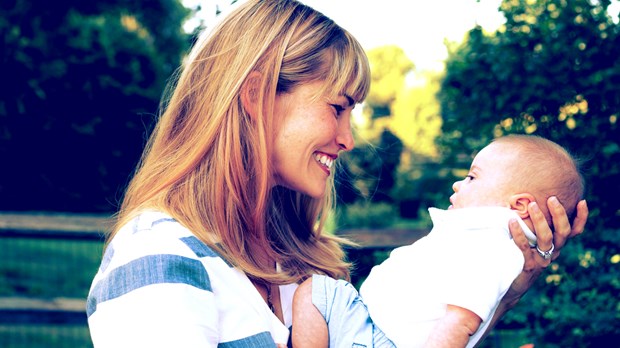Dear Parents of a Child with Special Needs

Dear new parents of a child with special needs,
I saw your birth announcement. Congratulations! The way I see it, you had two deliveries yesterday. One was bringing your baby into this world. The other was publically sharing about your baby’s extra needs. Both required deep courage. You delivered graciously and with joy.
I’ve been thinking of you all night. I got up to nurse my baby at 3:40 A.M., and I can’t go back to sleep without writing you. I’ve been a parent for a total of seven years, but my experience in this new world of special needs is small. I’ve been doing this for almost eight months, and I’m still struggling to understand my own feelings about my baby’s diagnosis. But I have learned a few secrets—the kind you write each other about at four in the morning. (You’re parents of a newborn. You’re up anyway, right?)
Here’s what I want you to know:
You’re Going to Weep
When my child was born, I wept. Some of my tears came from a place of love, and some from a place of fear. And I’ve learned I don’t have to categorize those tears. Parenting my child with special needs will mirror the human experience. It will be wonderful, and it will be painful.
I’ve learned to think of my grief and my deep love for my baby as a braid woven through my chest, pulled tight. I don’t have to know where the love ends and the sorrow begins, only that they wrap around one another. Sometimes it’s hard to distinguish my anxiety from my joy, my love for my child from dreams that have been lost.
I simply know this: The love I felt when I first saw my baby is not diminished by my sorrow. Love is never diminished by pain. They have always lived equally together as long as parents and babies have lived on this earth.
If you need permission to cry, here it is. You get to cry because your baby is beautiful and particularly yours. You get to cry because this diagnosis is hard and no parents ever want their child to suffer. And you get to cry because your baby cried all night and you’re tired. Which brings me to my next point.
People Mean Well
Just because your baby has unique challenges doesn’t make you a saint. I refuse to count the number of people who have told me they admire me for being Ace’s mom. It’s nice of them to say that. But saying that I’m special sounds a little like this: “You are amazing for loving your child! I just couldn’t do it!”
I assure you that hurts. But no one who says this means to hurt me. There are people who think my husband and I are special for loving and raising our baby. That’s because our child’s diagnosis is frightening. And it’s also because loving Ace is changing us in beautiful ways.
Most people simply don’t know what to say. So when their words are painful or trite I’ve learned to tell myself that they’re doing their best. What they want to say is, “This thing you’re doing is hard.” If I let their fumblings come to me coated in grace, I will hear their kindness. The compassion is in their eyes if I’m willing to see it.
Blessing Doesn’t Mean What You Think
Often people will call my baby a “blessing.” And most of the time when they use that word they mean something close to rainbows and unicorns. They mean my baby is an angel who will always bring happiness.
Sometimes it’s hard to hear that (despite my baby’s cherub-like cuteness) because Ace is just as human as any other child. He may be sweet, but one day he’ll whine about dessert and picking up his room, just like his brothers.
So I’ve been teaching myself what blessing really is. You know the story of Jacob and God struggling all night in that mystical wrestling match: “I will not let go until you bless me!”? I’m making that my parenting mantra. This journey will be hard, for us and for our children. Blessing is hard won. Jacob wrestled all night and demanded a blessing. You know what he got? A lifelong limp and a new name. Also? Legacy. He was the father of a great nation.
Blessing is not for the faint in heart. It’s always accompanied by suffering. I’m learning to embrace the struggle. I won’t let go until God blesses me.
And when acquaintances say blessing without acknowledging wrestling, I don’t have to be angry. I just reinterpret their words for myself. I want to learn to hear the truth in every easy phrase dished out for shallow comfort and find gratitude there.
Every Parent Suffers
Most babies don’t struggle to breastfeed because of low muscle tone or illness. Most people don’t have to send their newborn into heart surgery. I’m sorry your first days of parenting are extra hard. But here’s the truth: Every parent suffers deeply, whether you suffer at the beginning or later. Whether your suffering is over the rebellion of your child or your own daily parenting failure, being a parent is always hard. It is always beautiful and miraculous and heartbreaking. Your heart is breaking a little earlier than most.
I think that’s what people mean when they say you’re special or that your child is a blessing. They mean that you’re learning the secret of suffering earlier; you are becoming wise.
In that braid of love and sorrow the third strand is wisdom. It’s there already, woven so tight you may not recognize it yet. You don’t have to. Right now you just get to receive. Receiving sounds passive, but it’s not. It’s the work of labor, of delivery. It’s the work of bringing a child into this beautiful and dangerous world, cleaning her body and holding her tight.
Your Child Bears the Image of God
What makes a human being valuable? The world tells us that the most important people are the smartest, the most beautiful, the most successful. You will hear other parents brag on the playground about their child’s physical prowess or intellectual superiority. They’re simply buying into the story we all tell ourselves when we’re afraid: that the more impressive we are, the more worth we have.
This is your moment to undo that lie in your own heart. You are not your performance. Your baby is not more or less valuable because of what he or she can or can’t do. Your and your child’s value is found in a more secure, powerful place, in the core of your humanity.
We are all made in God’s image. So though your child may struggle to walk or eat, though your child may not be able to connect relationally or learn to read, though your baby may meet milestones more slowly, your child is fearfully and wonderfully made. Your child is enough because our Creator has made your child enough.
Our value is found in our belovedness. Whether we can walk or speak or impress any other human on this earth, we are deeply and unconditionally loved by our Maker.
The image of God is a beautiful and dangerous thing. And so is your child’s life. It was given to your care by the God of creation. You are highly favored, friend.
Do you remember that Mister Rogers song, “It’s You I Like”? It says, “It’s you I like, every part of you.” Sometimes I sing that song for Ace while I’m changing his diaper or we’re playing on the floor. I sing it when I remember the panic that rose up in my throat in those prenatal diagnosis days, and in the hospital after his birth, when I’d let myself imagine what his diagnosis would ask of us. Sometimes that panic still shows up. But, almost eight months in, I need you to know this: I like him, I like him, I like him, exactly as he is.
I receive my child. I won’t let go until you bless me. Pray these things. And hold tight, dear ones. This is a wonderful, dangerous season of wrestling. Don’t let go until you’re limping. Until your name is changed. Until you’re blessed.
With love,
Micha
Micha Boyett is a blogger, wife, mom, and the author of Found: A Story of Questions, Grace & Everyday Prayer. A former youth minister, she’s passionate about monasticism and ancient Christian spiritual practices and how they inform the contemporary life of faith. Micha and her husband live in San Francisco with their three boys. A version of this article first appeared on MichaBoyett.com.
Read more articles that highlight writing by Christian women at ChristianityToday.com/Women
 Read These Next
Read These Next


 Is Your Teen Tired of Church?When the pillow feels better than praise and worship
Is Your Teen Tired of Church?When the pillow feels better than praise and worship
 One Way to Revive Your MarriageDiscover the power of validation.
One Way to Revive Your MarriageDiscover the power of validation.








 Homepage
Homepage